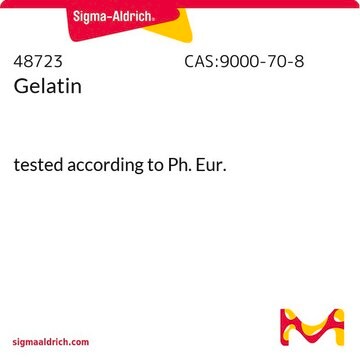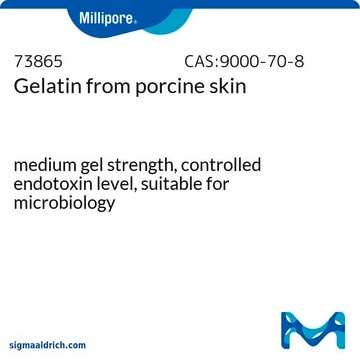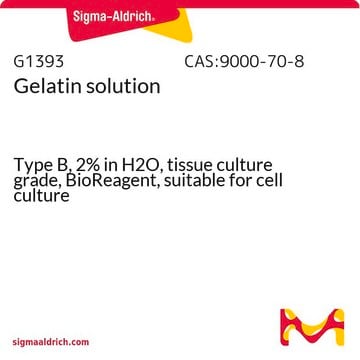48720
Gelatin from porcine skin
suitable for microbiology, low gel strength
About This Item
Recommended Products
biological source
Porcine
Quality Level
sterility
non-sterile
form
powder
quality
low gel strength
ign. residue
≤2%
loss
≤15% loss on drying
pH
4.0-6.0 (50 °C, 67 mg/mL in H2O)
gel strength
90-110 g Bloom (67 mg/ml water)
solubility
H2O: 67 mg/mL at 50 °C, slightly hazy, light brownish-yellow
anion traces
chloride (Cl-): ≤2000 mg/kg
cation traces
Ca: ≤2000 mg/kg
Cd: ≤5 mg/kg
Co: ≤5 mg/kg
Cr: ≤10 mg/kg
Cu: ≤50 mg/kg
Fe: ≤50 mg/kg
K: ≤500 mg/kg
Mg: ≤500 mg/kg
Mn: ≤5 mg/kg
Na: ≤3000 mg/kg
Ni: ≤5 mg/kg
Pb: ≤5 mg/kg
Zn: ≤10 mg/kg
application(s)
microbiology
Looking for similar products? Visit Product Comparison Guide
Application
Gelatin has been used in many applications. It has use in coating cell culture to improve attachment of cells, being added to PCR to stabilize Taq DNA, as a blocking reagent in Western blotting, ELISA, and immunochemistry, and as a component of media for species differentiation in bacteriology. As a biocompatible polymer, it has used as a delivery vehicle for release of active biomolecules and in generation of scaffolds for tissue engineering applications. In the pharmaceutical industry, geltan can be used as a suspending and encapsulating agent, among other applications.
Components
Caution
Other Notes
Storage Class Code
11 - Combustible Solids
WGK
nwg
Flash Point(F)
Not applicable
Flash Point(C)
Not applicable
Personal Protective Equipment
Choose from one of the most recent versions:
Already Own This Product?
Find documentation for the products that you have recently purchased in the Document Library.
Customers Also Viewed
Our team of scientists has experience in all areas of research including Life Science, Material Science, Chemical Synthesis, Chromatography, Analytical and many others.
Contact Technical Service













